Albany County lawmakers push for UW Lab School solution
Proposed legislation would force the local school district and the university to reach a compromise. The Joint Education Committee heard from both parties, and the school’s principal, Thursday.
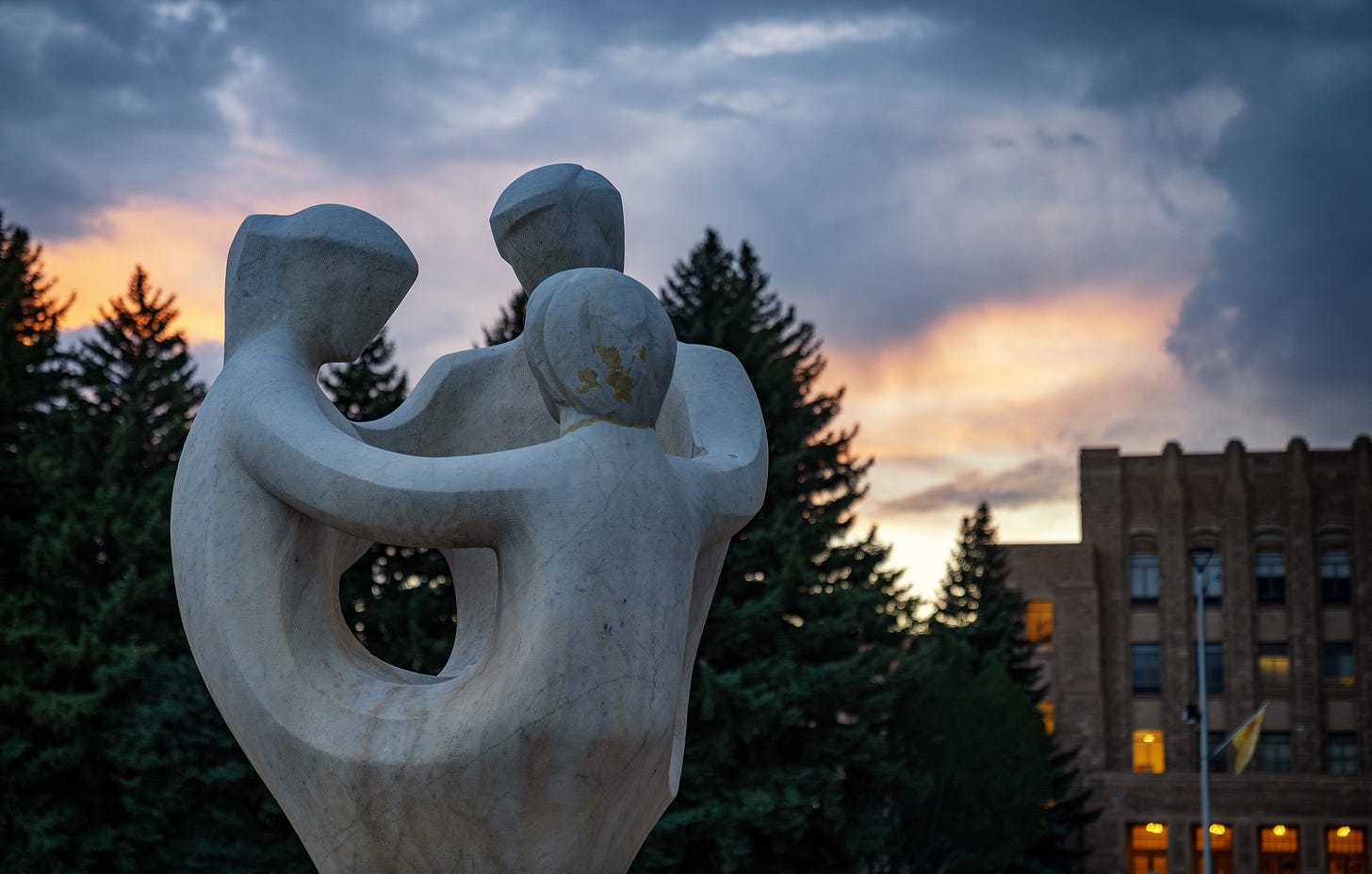
The fate of the University of Wyoming Lab School remains uncertain — but Albany County’s lawmakers have launched a united, bipartisan push to keep the school, or some version of it, alive past its planned 2025 closure.
Disagreements about the purpose of, and control over, the lab school’s future have divided the local school district, the local university and the local lawmakers who represent Laramie’s citizenry.
The dispute came to a head during a Laramie-heavy meeting of the Joint Education Committee last week, during which all parties re-litigated the situation in a public forum.
The Lab School has existed in some form since the early days of the university and was incorporated into Albany County School District No. 1 in 1999. Today it is tuition-free, open to all families in the district, and determines its enrollment by lottery. The school was enabled and continued by periodic agreements signed by the university and the school district.
The latest agreement extends the school’s mandate through only the current academic year, and represents a failure on the part of the entities to agree on a more customary and substantial five-year memorandum.
Local outrage about the coming closure has caught the attention of Albany County’s entire legislative delegation — a group of four representatives and two senators which includes both Republicans and Democrats.
Together, the lawmakers have penned a letter addressed to both parties and shared with state leaders announcing their plan to introduce legislation that will save the school.
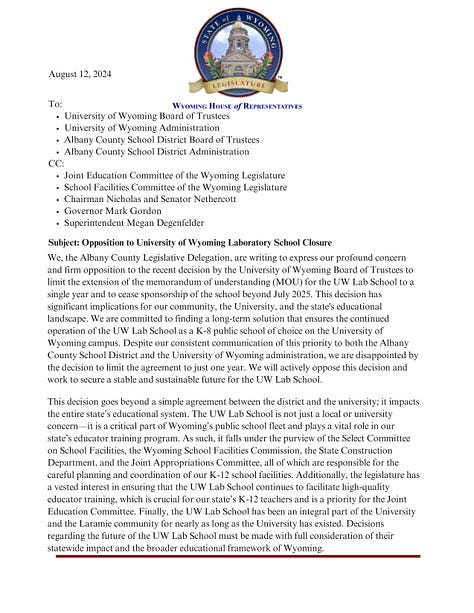
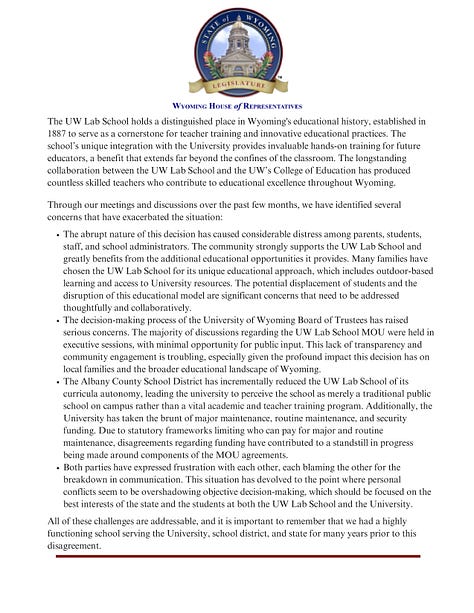
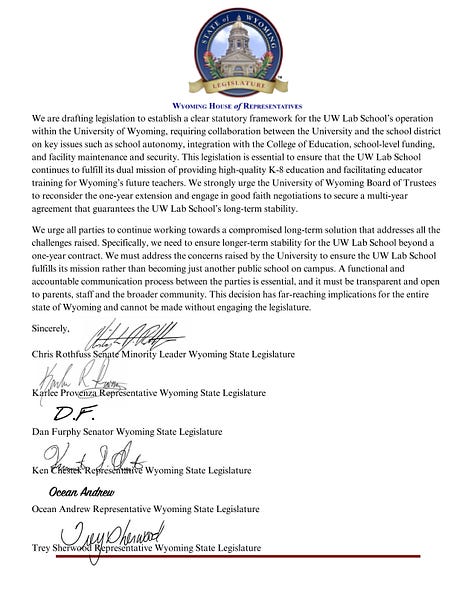
“This decision goes beyond a simple agreement between the district and the university; it impacts the entire state’s educational system,” the lawmakers write. “The UW Lab School is not just a local or university concern — it is a critical part of Wyoming’s public school fleet and plays a vital role in our state’s educator training program.”
The Joint Education Committee hosted its final meeting of the interim Thursday. While it was too late to draft a committee bill, the lawmakers heard from both university and school district leaders.
While university leadership highlighted their concerns with the school as it exists and questioned whether the state still needs such a school, district leadership pushed back on the idea of a legislative solution, and argued for greater local control.
Background and proposed legislation
The Lab School is located on the UW campus, serving as both a training ground for aspiring teachers enrolled in the university’s College of Education and as a school of choice for families residing in Albany County School District No. 1.
The school’s unique situation — being located on a university campus but operated by the local school district — has required both relevant entities, the university and the district, to sign agreements outlining their respective expectations and responsibilities.
This year, negotiations over the next memorandum broke down and UW offered the district a one-year MOU that would keep the school operating only through the 2024-2025 academic year. Both the university and the district note that disagreements about maintenance funding responsibilities, safety concerns and control over the curriculum caused the negotiations to break down.
If no action is taken, it appears likely the lab school will shut its doors for good at the end of the current school year.
In their letter, Albany County lawmakers say they are “disappointed” by the one-year MOU.
“We strongly urge the University of Wyoming Board of Trustees to reconsider the one-year extension and engage in good faith negotiations to secure a multi-year agreement that guarantees the UW Lab School’s long-term stability,” they write.
But the lawmakers are doing more than asking.
“We are drafting legislation to establish a clear statutory framework for the UW Lab School’s operation within the University of Wyoming, requiring collaboration between the University and the school district on key issues such as school autonomy, integration with the College of Education, school-level funding, and facility maintenance and security,” they write. “This legislation is essential to ensure that the UW Lab School continues to fulfill its dual mission of providing high-quality K-8 education and facilitating educator training for Wyoming’s future teachers.”
A draft of the proposed legislation is not yet available. Rep. Karlee Provenza (HD-45) and Sen. Chris Rothfuss (SD-9), both of Laramie and both members of the Joint Education Committee, will likely co-sponsor the bill.
ACSD No. 1 wants to call its own shots
During public testimony Thursday, Albany County School Board Chair Beth Bear told lawmakers UW’s decision came as something of a surprise to the district.
Bear said the district and the university had been negotiating since 2023, “ultimately reconciling challenges regarding maintenance, safety and curriculum in the spring of 2024.”
“This June, the university notified ACSD No. 1 of their intent to only enter into a one-year MOU, ending the lab school on the UW campus in June, 2025,” Bear said. “The district asked for a two-year MOU in July of 2024 and was returned the signed MOU by UW for only one year in late July, 2024.”
The board Bear helms agreed to the one-year MOU in the hope the parties could keep working toward a longer term agreement.
“It is our understanding that as of today, the position of UW is that the UW Board of Trustees has made their final decision on this and that the school will not operate on campus past this current school year,” Bear said. “Although regrettable, the district ultimately accepts this decision by UW as we have no choice but to move forward and plan for the future.”
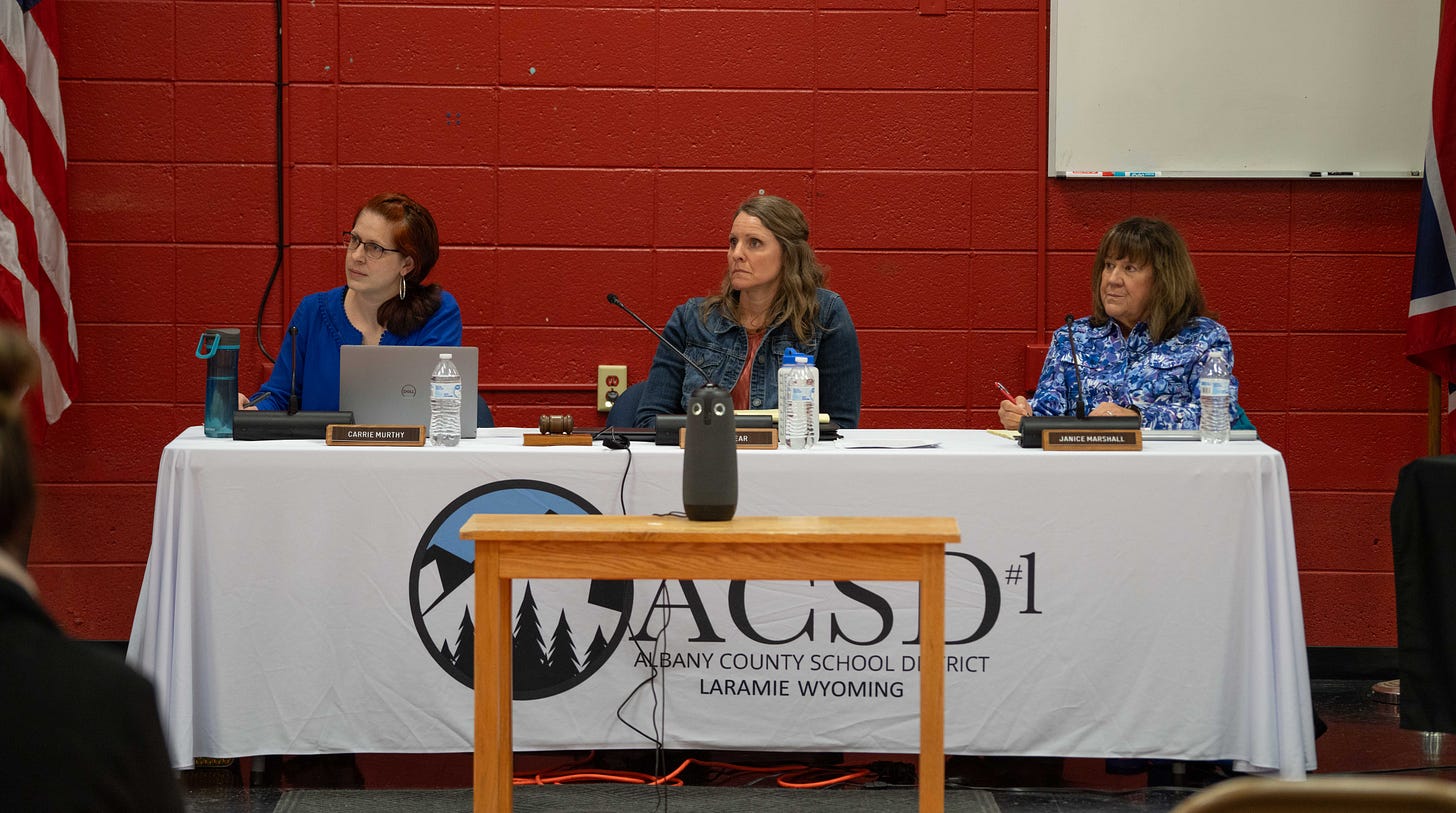
The district has not made a final decision on how to proceed.
It hosted listening sessions, during which parents and community members asked whether core features of the lab school could be retained at other schools in the district, or whether the community could look at creating an alternate school of choice off-campus.
Those listening sessions served as a preview for the board’s own deliberations.
“It is our intent to make a decision regarding the lab school’s future as soon as possible, for the sake of our students, families and educators,” Bear told the committee. “While we appreciate the concern and attention of our legislators on this issue, we view this as a matter of local control, with the decision to move or close a school resting with our locally elected school board, not with our legislature.”
Bear said her board, as the elected body entrusted with the management of local schools, should not be forced into an agreement with UW by the state.
“We have serious concerns over a legislative mandate requiring a continued partnership between ACSD No. 1 and UW for the operation of the lab school, and do not agree with the precedent that sets for public schools and our county or the state,” she said.
But Rep. Provenza, echoing the letter she and her colleagues signed, said the future of the lab school is very much a state concern.
She said the sudden closure would push the school’s 162 students into the state’s public education system. Additionally, Provenza said the lab school isn’t just a choice school; it’s also a training ground.
“Historically, the school has provided a job training program for teachers across the state — and we’re at an all time low of people who are applying to be teachers and having a pipeline,” she said.
Sen. Rothfuss floated the idea of altering the proposed legislation to support a state- or university-run lab school apart from the local school district.
“That wasn’t necessarily something we considered, but based on this discussion, perhaps that would be more favorable,” he said.
Another senator put the question even more bluntly.
“What’s your position?” Sen. Bo Biteman (SD-21) asked. “Do you want a lab school or not?”
Bear said “that’s not a yes or no question for us right now” and that she couldn’t commit the district to any one path, or voice support for any specific legislation, because the board has yet to vote on the future of the lab school.
“We solicited feedback. We’re looking at that feedback,” Bear said. “We’re engaging our community to see if we want to move the lab school to a new location, if we want to dissolve the lab school and put those students into other schools … What I can tell you is our intent is to try to make a decision by January for our students and for our educators. And what we’re asking today is for the ability to do this locally.”
UW says lab school ‘is no longer needed’
UW leaders told the committee the district was to blame for the breakdown in negotiations and questioned whether the state still needed a lab school, on campus or otherwise.
“The problem is that that school has just now become another school in the Albany County School District system,” said Kermit Brown, Chairman of the UW Board of Trustees. “It’s not really a laboratory anymore. We don’t need it for teaching … We can put student teachers all over the state. They can get the education that they need to be teachers, and they can teach in schools — and not just in Laramie, because, as we all know, Laramie isn’t necessarily like the rest of the state.”
Apart from whether the school is still necessary as a training ground and innovation lab, Brown spelled out for lawmakers the disagreements that ultimately led to a limited one-year MOU.
The first concern was security. Specifically, the heightened security the university views as necessary given some ongoing campus construction now nearing completion.
“We have the added complexity of the dorms that we’re building next door,” Brown said. “They’re conjoined with this school. And that, we feel, is not a really good idea. We’re going to have 900-some students in there. We’re going to have all kinds of things going on. And you have this lab school right next to it. That is another complexity that has entered into the picture.”
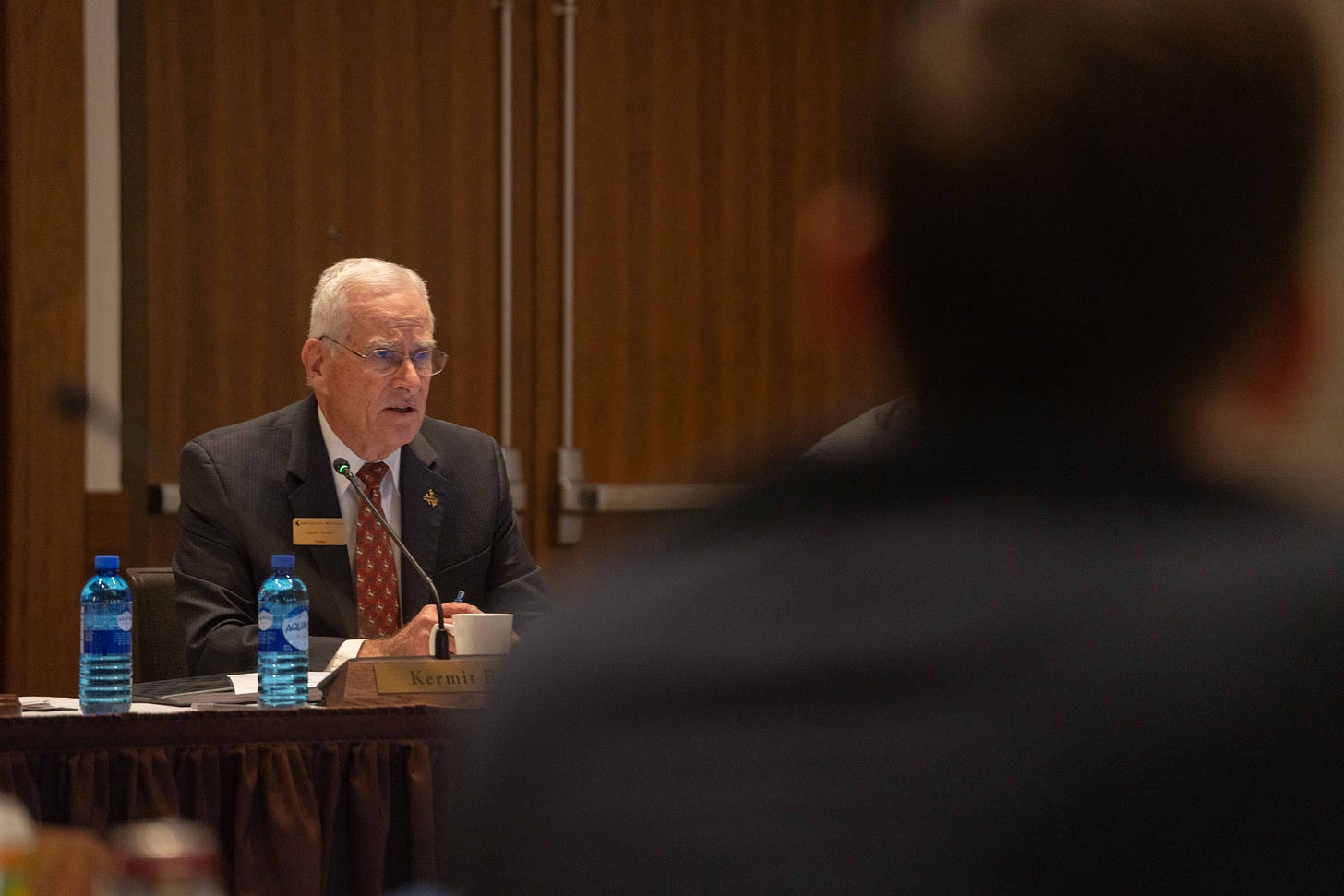
Vice President for Campus Operations Bill Mai added that the building which houses the UW Lab School is 75 years old and has already required significant upgrades related to “life, health and safety issues.”
“I do want the committee to understand that the university has sunk in the neighborhood of about $5 million into specific projects for the lab school itself since I got to the university about 11 or 12 years ago,” Mai said. “We’ve done what we can from a security standpoint.”
Both Mai and Brown made allusions to safety-related “incidents” that had “involved a few lab school kids.” They said they wouldn’t share details in public testimony, but that these incidents inspired UW to request a change to the customary five-year agreements between the district and university.
“Last year, we offered the five-year extension, and the only change that UW was asking for to that MOU was some strengthened security language to say there has to be better communication when there are incidents,” Mai said. “It didn’t go into the details. But that was all we asked for, and the district came back and asked to change that language.”
Mai said the new language UW wanted “didn’t really have any teeth to it.”
“There’s nothing we can do to say, ‘If you don’t report this, you have 30 days and you have to clear 250 kids off of our campus,’” he said. “That’s just simply not going to happen.”
Mai said the district also asked for changes to the maintenance funding language, but added concern about this element was a “red herring” since UW had never charged ACSD No. 1 more than $4,000-$5,000 a year despite the significant costs associated with the old building.
“That discussion went back and forth for many months,” Mai said. “And our trustees, I will say, were getting a little impatient with me as far as getting an MOU signed.”
There were also disagreements about the language detailing control of the curriculum, which kicked off further discussion on campus about the lab school’s usefulness and even questions about whether it still served as a place for innovation — or simply as another district school.
Ultimately, the parties couldn’t reach an agreement that UW was happy with, so the university offered a one-year MOU without the changes it wanted, with the intention of shutting down the lab school at the end of this current academic year.
Brown added the district had no right to be surprised about that MOU given how long these negotiations went on — and how poorly they were going.
“This has been going on for some time; it’s not like we pulled the trigger on them in six or eight months or a year,” the trustee said. “It’s been going on for quite some time, and anybody that was paying attention could feel the ground shaking all around them. So there’s been adequate notice. It’s not a surprise.”
But Rothfuss pushed back on the university leaders, questioning their decision to pull the plug.
“In my view, those are all valid concerns,” the senator said. “The problem that really presents challenges to the community is: rather than resolving those concerns, the decision was made to, ‘Well, this has become hard. It might have worked five years ago just fine, but now it’s hard. So let’s close the school’ — rather than: ‘How do we resolve these challenges that are very legitimate, real challenges?’”
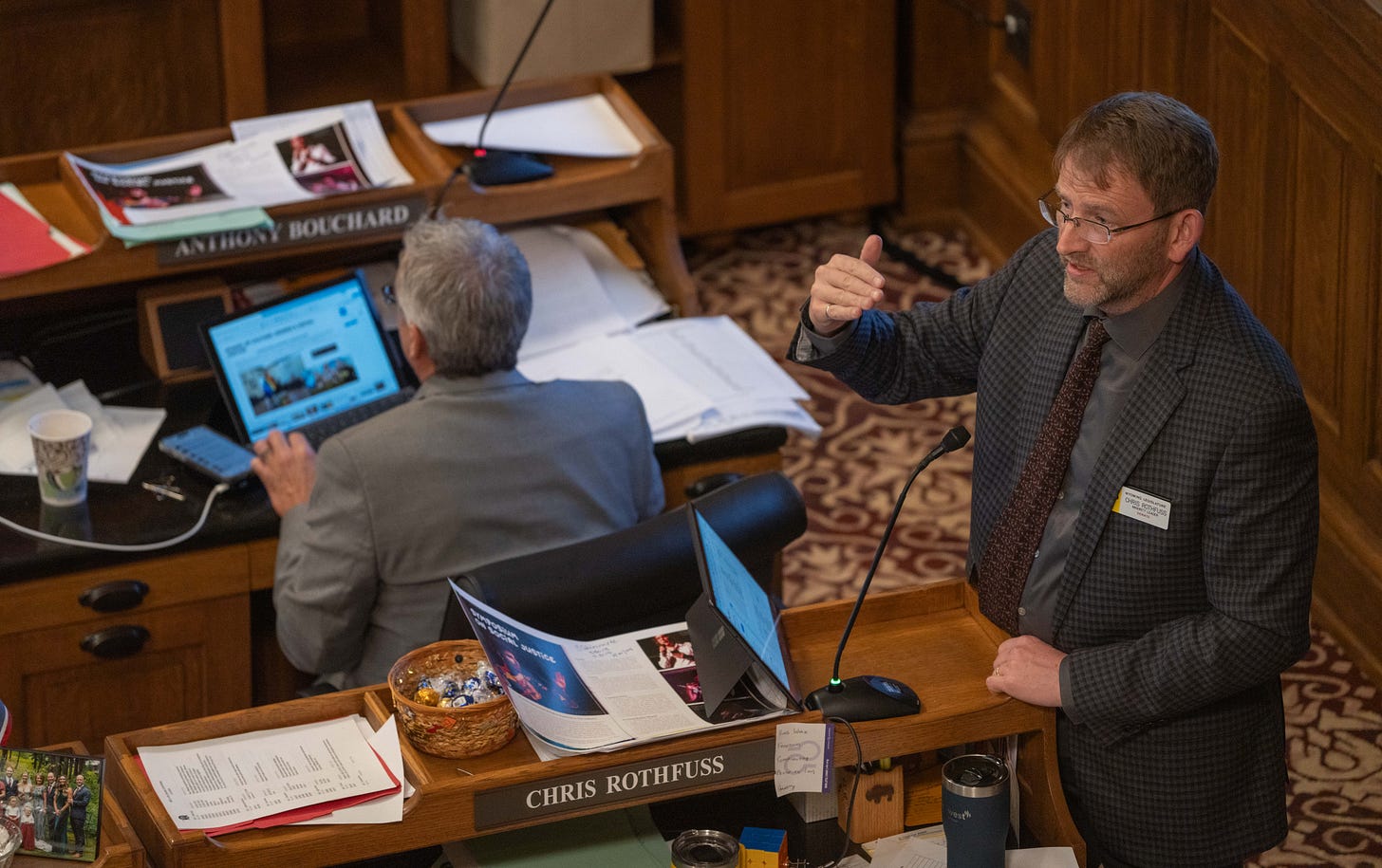
Rothfuss acknowledged student teachers can gain experience outside of Laramie and online but said “the value of the lab school” is that an aspiring teacher can easily drop into an elementary class as it’s being taught, observe for a while, and return within minutes to their own instructor to discuss what they observed.
That’s something that can’t be easily replicated off-campus, Rothfuss said.
Brown responded he wasn’t qualified to speak about the value of different pedagogical strategies, but was convinced that the university doesn’t need the lab school to provide useful student teaching experiences.
“I am assured by the faculty and by the powers that be in the College of Education that we are doing, in fact, a better job,” Brown said. “So the one thing I can say to you, Senator Rothfuss, is I think we’re doing a better job than we were five years and 10 years ago.”
Rothfuss said he’d be more inclined to trust that statement if it was coming from professors and other educators instead of a trustee and an administrator “and particularly if they were feeling very free to say their mind, speaking freely on their own behalf, exactly what they felt.”
“Nothing about my engagement on the lab school issue has suggested that the College of Education was advocating for closure of the UW Lab School,” Rothfuss said. “But those folks are not here right now, and I guess I have some concerns there … that maybe there isn’t an overwhelming support for closing it within the current College of Education.”
But Brown said he had the college’s backing — or at least the backing of its leadership.
“The reason Dean [Jenna Min] Shim is not here today is that she did not want to deal with this political atmosphere,” Brown said. “That’s why I’m appearing and she’s not. She is not opposed to anything that I’ve presented to this committee today.”
Throughout the testimony, Brown’s — and the university’s — position was consistent: the UW Lab School has outlived its usefulness and today exists as just another district school, one that happens to be located on the UW campus.
“The school is no longer needed. We don’t need it as a teaching lab. We have other ways — more efficient and, frankly, better ways of educating teachers,” Brown said. “It’s not a special teaching lab of some kind anymore.”
Lab School leaders, parents hope for a solution
The committee also heard from public commenters affiliated with the Lab School, including teachers, parents and alumni who disagreed with Brown’s assertion that the school was “no longer needed.”
Jess Willford, a long-time university employee with a child at the lab school, said the on-campus school is unique and ought to be preserved.
“Each of our amazing schools in the Albany County School District provide a unique learning opportunity to their students,” she said. “Slade Elementary provides dual language. Indian Paintbrush has the GATE program, and on and on. The UW Lab School provides access to the University of Wyoming.”
Willford listed specific ways the Lab School’s location provides benefit to its students.
“Fourth grade students walk to Old Main to learn about turkey vultures; third graders walk to the Geology Museum to learn about topography; middle schoolers walk to the makerspace to learn about robotics; all children walk to their library — a university partnership that is an unparalleled resource for children’s literacy,” Willford said. “All of this goes away if UW Lab School’s removed from [campus].”
She acknowledged the issues raised throughout public testimony, but said none were “unsolvable.”
Willford shares this view with the lab school’s principal, Brooke Fergon, who also testified Thursday.
Fergon acknowledged that pandemic difficulties and high levels of turnover had left both the lab school and the College of Education with new leadership, a strained relationship, and lessened impact.
But these problems are not insurmountable, Fergon said.
“There is capacity to rebuild this culture of mentorship and research,” she said to the committee. “I urge you to consider how any proposed legislation could impact both UW and ACSD1’s teachers and students.”
She said sorting out the current issues will take more than forcing UW and ACSD No. 1 to the table.
“Solidifying the MOU will only be a first step,” Fergon said. “Facilities and staffing issues must be addressed for long term viability of the school and any successful future arrangement would need to clearly define each party’s commitments, promote collaboration and honor all school stakeholders.”




The Lab School community, for a variety of reasons, unanimously, STRONGLY supports ending the partnership between ACSD1 and UW and fully reintegrating into the university. Please reach out to the Joint Education Committee and back us up! We need all the voices we can get to ensure we're heard and taken seriously.
charles.scott@wyoleg.gov david.northrup@wyoleg.gov bo.biteman@wyoleg.gov evie.brennan@wyoleg.gov lane.allred@wyoleg.gov ocean.andrew@wyoleg.gov chris.rothfuss@wyoleg.gov cheri.steinmetz@wyoleg.gov ryan.berger@wyoleg.gov landon.brown@wyoleg.gov ken.clouston@wyoleg.gov martha.lawley@wyoleg.gov jerry.obermueller@wyoleg.gov karlee.provenza@wyoleg.gov
The lab school is important for school choice in the district but enrollment is not solely based on lottery - they have a selection process of making sure your child is a good fit. It could better serve the community to reach out to lesser served areas - where some people don’t even know of its existence. A quick survey of the current enrollment would highlight that fact.